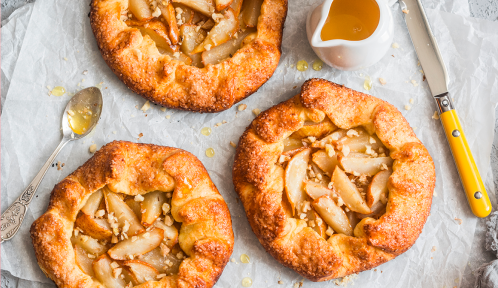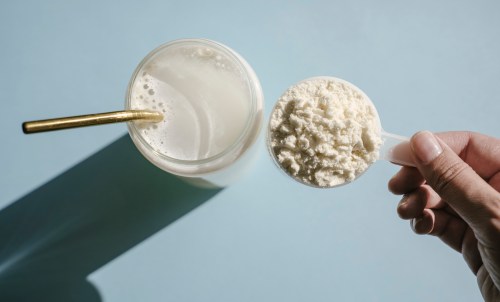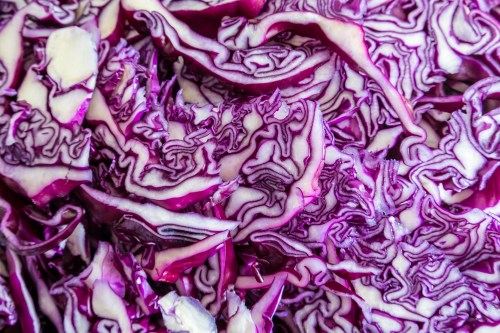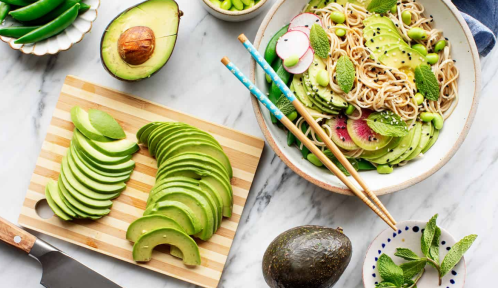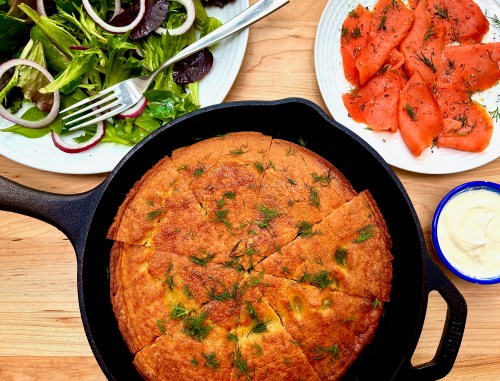While apples tend to steal the spotlight, we’re here to make a case for eating more pears to help keep the doctor away. After all, a single pear packs nearly double the amount of fiber compared to an apple, which means major benefits for your digestive tract—but that’s not all this fruit has to offer.
Experts in This Article
On the contrary, we spoke with several nutrition experts who confirmed that pears are tied to a number of positive health outcomes, like improving your immunity and reducing chronic inflammation. To help ensure you have plenty of ways to use the pears you pick up the next time you’re at the store, we’ve gathered several pear-forward recipes that will make your digestive system sing.
The gut health benefits of eating pears
According to Jim Morris, Pear Bureau Northwest’s marketing communications manager, pears offer several impressive health benefits… starting with the fact that they’re one of the best fruit sources of fiber. “One medium-sized pear provides six grams of fiber, or 21 percent of the recommended daily intake,” Morris says. But what makes fiber so important, especially for gut health, you may wonder? Well, Morris says fiber and gut health are essentially the perfect pear (ha).
“Along with helping improve bowel regularity, a diet high in fiber can help reduce cardiovascular disease and colon cancer. Pears also contain prebiotic fiber, which fuels beneficial probiotic bacteria that aid in overall gut health,” Morris says. What’s more, according to Amy Shapiro, MS, RD, CDN, a registered dietitian and the founder and director of Real Nutrition, prebiotic fiber can help feed the healthy bacteria in the gut, which can, in turn, improve immunity, skin health, and overall digestion.
Morris also says that pears are high in antioxidants, which are notorious for fighting inflammation and combatting free radical damage. “A medium-sized pear also provides seven milligrams of vitamin C, or eight percent of the recommended daily value, which is vital for normal metabolism, tissue repair, proper immune function, and protection against infectious diseases,” Morris says.
Christina Manian, RDN, a Boulder-based registered dietitian and sustainable food systems professional, also adds that pears are particularly rich in plant compounds called lutein and zeaxanthin—potent anti-inflammatory agents which help to ward off chronic illness. “Red pears contain anthocyanins, which are heart protective, and green pears contain lutein and zeaxanthin, which help to protect vision with age. They also contain flavonoids which help to decrease chronic inflammation in the body allowing for overall health and decreased risk of illness,” Shapiro says.
Another benefit of pears is that they are low on the glycemic index. “Pears impact your blood sugar gradually and evenly, which steadies your levels longer and helps prevent sugar spikes. There is an important difference between added sugar and the naturally occurring sugar found in fruit. In fruit, such as pears, the natural sugars are balanced by vitamins, minerals, water, and fiber—all important nutrients for those looking to improve their overall health,” Morris says.
The best way to keep pears fresh for longer
If a gritty pear gives you the ick (we hear you!), there are several easy ways to help keep them fresher for longer. “Many people don’t know that pears are one of the few fruits that don’t ripen on the tree. Pears are harvested when they are mature, but they ripen after they are harvested,” Morris says. This means that it’s common to find unripe and mostly firm pears at the store. But if you’re looking to pick the perfect pear, Morris recommends conducting the “check the neck” test, which involves applying gentle pressure to the neck of the pear near the stem with your thumb: If it yields, it’s ripe and ready to enjoy.
Of course, if all you can find are super-firm ones, there’s no need to fret. Morris suggests simply leaving them out at room temperature for a few days to speed up the ripening process. “In a fruit bowl on your kitchen counter works great. If you want to speed up the ripening process, store them next to other fruit that gives off ethylene, such as bananas or apples. If your pears are ripe but you’re not quite ready to enjoy them, putting them in the refrigerator will keep them fresh a few more days,” he says.
3 easy pear recipes packed with tons of gut-friendly fiber
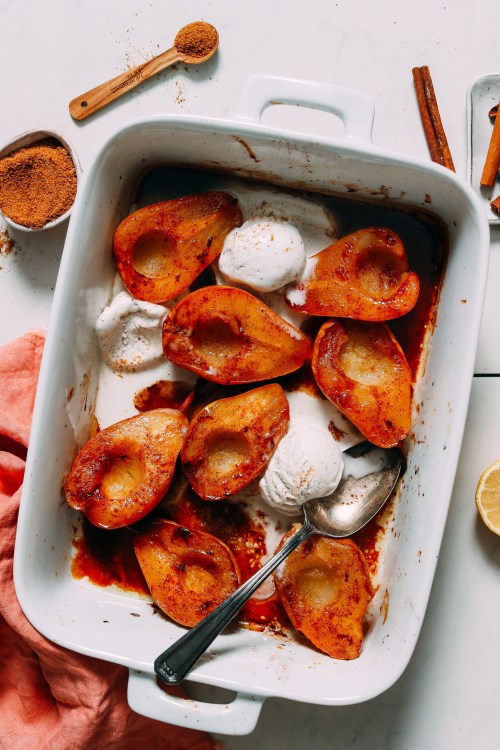
1. Easy Vegan Baked Pears
This air fryer-friendly vegan baked pears recipe by Minimalist Baker is beyond simple to make and tastes like a dessert that belongs at a five-star resort. The natural sugars in the pear caramelize ever so slightly as you bake (or air fry) these halved pears garnished with warming, anti-inflammatory spices like cinnamon, nutmeg, and ginger.
Get the recipe: Easy Vegan Baked Pears
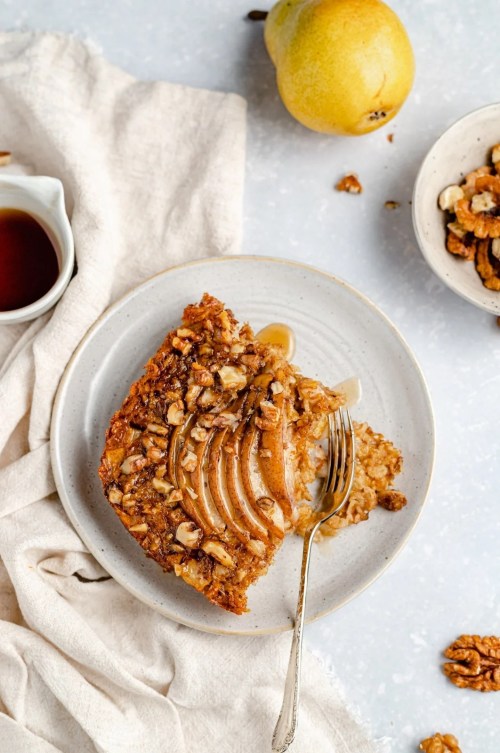
2. Vanilla Brown Butter Pear Baked Oatmeal
Oats are arguably one of the most versatile breakfast foods (aside from eggs). With the help of just a few ingredients, you can quickly transform them into a fiber-packed sweet (or savory dish), like this vanilla brown butter pear baked oatmeal by Ambitious Kitchen. It resembles more of a chewy granola bar than a bowl of creamy oatmeal, and no, we’re definitely not mad about it. On the contrary, this easy recipe makes transporting oats on the go that much easier—so you can nosh on this tasty snack as you run errands throughout the day.
Get the recipe: Vanilla Brown Butter Pear Baked Oatmeal
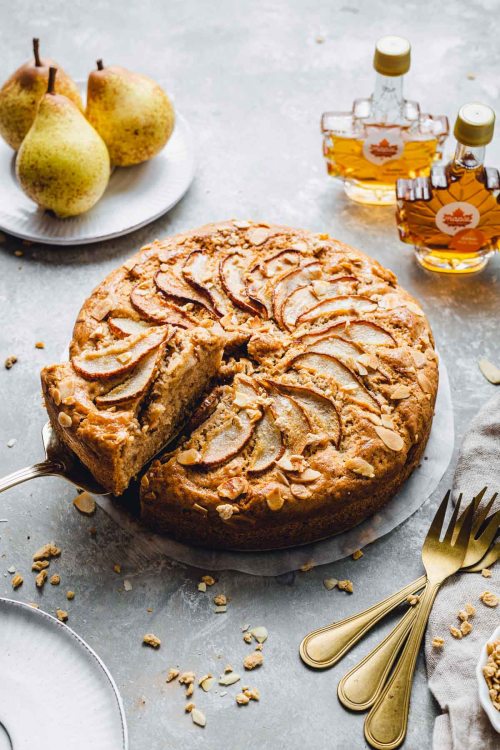
3. Vegan Spiced Pear & Almond Cake
What’s sugar and spice and everything nice? This vegan spiced pear and almond cake by My Vegan Minimalist, of course. Whether it’s for a birthday celebration or just a cozy weekend treat, this pear cake is sure to make you feel warm from the inside out. Plus, the recipe developer shows how to turn flaxseed into a vegan egg alternative for all your baking needs.
Get the recipe: Vegan Spiced Pear & Almond Cake
An RD shares the best foods that help you poop:
Sign Up for Our Daily Newsletter
Get all the latest in wellness, trends, food, fitness, beauty, and more delivered right to your inbox.
Got it, you've been added to our email list.
